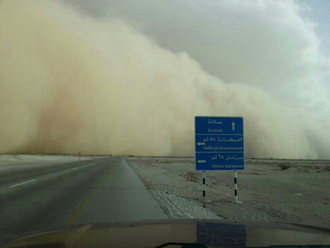Port-au-Prince: France's national anthem blared across the tarmac yesterday as Nicolas Sarkozy made the first visit ever by a French president to Haiti, once his nation's richest colony — offering aid to a country prostrate after a catastrophic earthquake.
Haitian President Rene Preval greeted Sarkozy as a brass band played the Marseillaise to start a quick tour of the earthquake ravaged capital and a French field hospital.
The two, both in dark suits, boarded an olive-drab helicopter and peered out of an open side door for an aerial tour of the devastated capital.
Some Haitians are welcoming France's new interest in their nation as a counterbalance to the United States, which has sent troops there three times in the past 16 years.
However, Sarkozy's visit is also reviving bitter memories of the crippling costs of Haiti's 1804 independence.
Brutal slavery
A third of the population was killed in an uprising against exceptionally brutal slavery, an international embargo was imposed to deter slave revolts elsewhere and 90 million pieces of gold were demanded by Paris from the world's first black republic.
The debt hobbled Haiti, it seemed for life.
A country plagued by natural and unnatural calamities was desperately poor and mismanaged even before a magnitude-7 earthquake smashed up Port-au-Prince on January 12, killing more than 200,000 people and leaving more than a million homeless.
Haitian politicians this week diplomatically skirted the question of French reparations — a demand put to Paris by ousted President Jean-Bertrand Aristide in 2004. That suggests Sarkozy's four-hour visit could herald a new era.
French officials say Sarkozy will announce details of "a French plan for the reconstruction of Haiti" — if Haitian officials agree.
It differs little from proposals from Haitian, US and UN officials to decentralise power away from the devastated capital and boost agriculture and tourism.
Another bit of help came from Air France yesterday. The airline said it will resume commercial flights to Port-au-Prince, operating twice a day, five times a week, beginning Friday. One will go to Miami while the other will fly to the Guadaloupe capital of Pointe-a-Pitre, where passengers can fly on to Paris.
The trip brings Sarkozy to an island where, French officials acknowledge, fascination with things French duels with strong, lingering resentments.
One official close to the French presidency, briefing reporters in Paris on condition of anonymity, hinted that France is not deaf to calls for reparations, calling Sarkozy's visit "an occasion to show that France is mobilising to give Haitians control of their destiny and pay past debts."
Far worse than Tsunami
The scale of devastation in Haiti is far worse than in Asia after the 2004 tsunami, a study has said, estimating the cost of last month's earthquake at up to $14 billion (Dh51.4 billion).
The report released on Tuesday from the Inter-American Development Bank (IDB) raised the possibility that the quake could be the most destructive disaster in modern history. Its stark assessment comes with Port-au-Prince still lying in ruins more than one month on, while the bodies of more than 200,000 dead pile up in mass graves outside the capital.
The study's release coincided with what would normally be Haiti's annual carnival, an explosion of pulsing music and colourful parades. But this year, the events have been cancelled as no one is in the mood to party.
"Indeed, in this respect the Haiti earthquake was vastly more destructive than the Indonesian tsunami of 2004 and the cyclone that hit Myanmar in 2008. It caused five times more deaths per million inhabitants than the second-ranking natural killer, the 1972 earthquake in Nicaragua," an IDB statement said.












